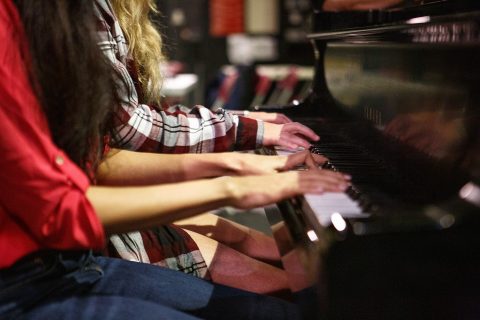Music Therapy (GrDip)
Program overview
The Graduate Diploma in Music Therapy is unique in Canada and the United States. It prepares students with strong backgrounds in music and psychology for careers in music therapy and leads to certification by the Canadian Association of Music Therapists (CAMT) and the Certification Board for Music Therapists (US). The music therapist guides clients towards health and wellness goals by fostering personal resources and potentials through expressive and receptive music experiences. The 28-credit program is the only one of its kind in Canada to be offered within a Creative Arts Therapies department. Students have the opportunity to draw upon numerous theoretical and applied approaches to music therapy practice.
Program structure
Degree Requirements
Fully-qualified candidates are required to complete a minimum of 28 credits.
Please see the Creative Arts Therapies Courses page for course descriptions.
Music Therapy Graduate Diploma (28 credits)
| 28 | credits of Core Courses:
|
| As part of course requirements in MTHY 510, MTHY 511, and MTHY 512, each student must successfully complete a minimum of 1,200 hours in the practice of music therapy, under faculty supervision, in approved practicum settings. Practicum experiences include individual and group formats with children, adolescents and adults and with a minimum of three different client groups. |
Admission requirements
Admission Requirements
- Bachelor’s degree with courses in Music (24 credits, which must include 6 credits in Musicology and 12 credits in Music Theory, or equivalents); Psychology (24 credits, which must include courses in Introductory, Developmental, and Abnormal Psychology, Theories of Personality, and Research Methodology, or equivalents); and Introduction to Music Therapy (3 credits), or equivalent.
- Evidence of primary instrument/voice performance abilities at the level of completion of a bachelor’s degree in Music; piano performance abilities at Grade 6 Royal Conservatory of Music level, and fundamental guitar and voice skills.
- Overall grade average of B- or better is expected.
- Previous experience in a clinical, rehabilitative or educational setting.
- Direct experience with the therapeutic process is highly desirable.
- Proficiency in English. Applicants whose primary language is not English must demonstrate that their knowledge of English is sufficient to pursue graduate studies in their chosen field. Please refer to the English language proficiency page for further information on requirements and exemptions.
Application process
Application deadlines

FALL
December 15

WINTER
n/a

SUMMER
n/a
Priority will be given to complete applications submitted by the deadline. In some cases, programs may continue to accept applications as long as there is space available.
International students: Considering the waiting period involved in meeting the entry requirements to Canada and Quebec, we strongly encourage international applicants to apply early and submit supporting documents prior to the deadline.
Tuition & funding
Tuition and fees
Tuition and fees of the program may depend on your student status, among other key factors. Estimate these costs based on the most common situations.
Awards and funding
Funding packages are generally available for students in thesis-based programs. Course-based students may be eligible for a number of donor awards, and may consult with their department for program-specific opportunities.
Out-of-province students
Get $2,000 in special funding for graduate diploma programs. Learn more
Other programs of interest

Advance your professional training, specialization, and research as a music therapist through the only advanced professional training program in the field in the province.
Department
Department of Creative Arts Therapies
Faculty

